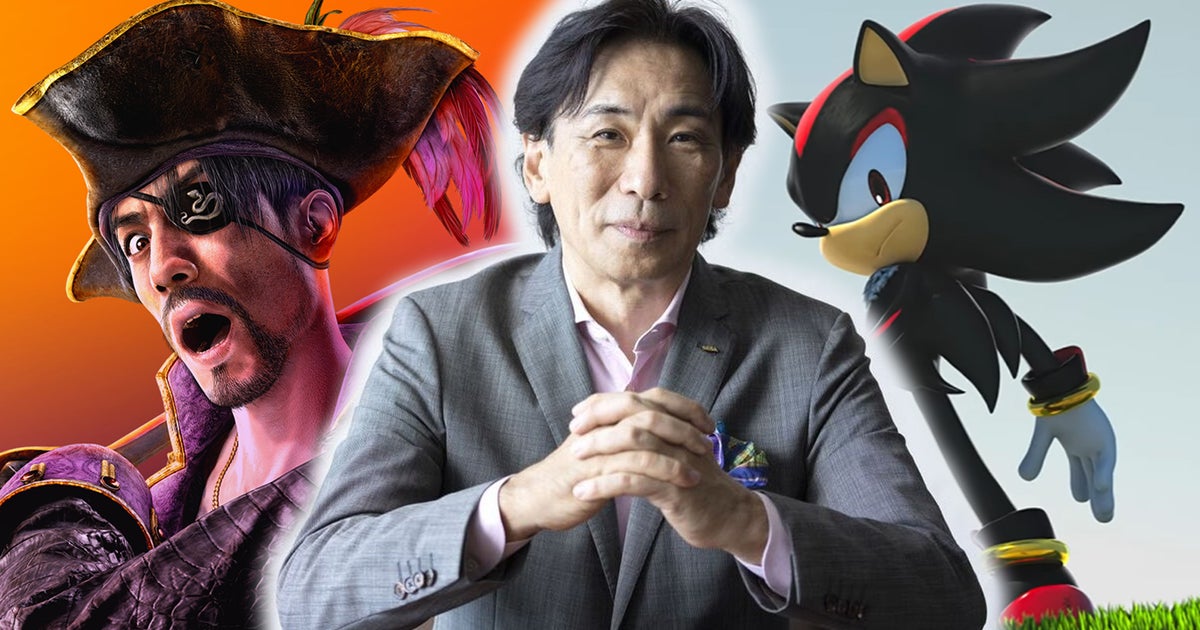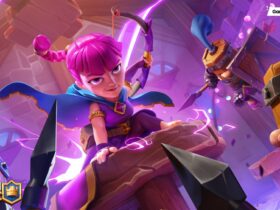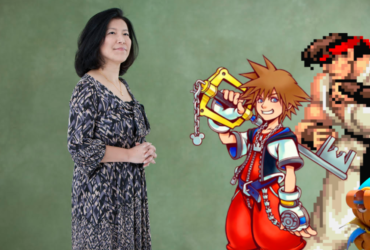The name Shuji Utsumi might not be as well-known as some other video game execs, but Sega Corp’s recently-appointed president and COO is an industry veteran who’s been toiling behind the scenes since Sony’s early planning of the first PlayStation.
At Sony in Japan, Utsumi helped PlayStation enter the already-heated battle for console supremacy – back then, between established industry players Nintendo and Sega. Next, he became one of the two original staff members at Sony Computer Entertainment America, tasked with expanding PlayStation’s reach in the US with games like Crash Bandicoot and PaRappa The Rapper. Indeed, it was his success joining the fray against Sega that saw Utsumi recruited to do the same for Sega Saturn.
So began Utsumi’s long association with Sega that continues today. Rising through the company quickly, Utsumi wound up in charge of Sega’s first-party games in Japan in time for the launch of Dreamcast, helping to oversee the release of Sonic Adventure, Jet Set Radio, Rez and Space Channel 5 with future collaborator Tetsuya Mizuguchi. Stints elsewhere saw Utsumi oversee Disney’s Japanese game division and work on Kingdom Hearts, before working again with Mizuguchi at Q Entertainment on cult classics such as Lumines and Child of Eden.
After the closure of Q Entertainment, Utsumi ultimately returned to Sega in 2019, building a fresh portfolio plan for the company with a global focus, becoming its chief strategy officer, then CEO of Sega of America, then chairman of Sega Europe. By 2022, Utsumi oversaw Sega’s global output, and was ultimately crowned its overall president in April this year. Utsumi was part of the braintrust that made the difficult decision to sell Relic Entertainment, cancel Creative Assembly’s unreleased shooter Hyenas, and eliminate around 240 jobs as the company refocused around Total War, Football Manager and Two Point.
This focus was mirrored in Japan with a push for Sonic, Yakuza/Like a Dragon and Persona – until last December’s The Game Awards 2023, that is, when Sega suddenly made five announcements in the space of 90 seconds and promised the return of Jet Set Radio, Shinobi, Golden Axe, Streets of Rage and Crazy Taxi. With tonight’s announcements of new Virtua Fighter and Sonic Racing (as well as yet more Like a Dragon), it’s clear Sega is now keen to revive more of its classic franchises portfolio after years of neglect.
This plan, it seems, comes from Utsumi, and is a deliberate strategy to recapture the essence of what once made Sega the spicy alternative to Nintendo’s beloved but conservative approach to video game development. Bringing Sega’s energy back, focusing on the value of Sega’s rich, underutilised legacy and leveraging them going forward is all part of his plan.
In anticipation of Sega’s just-announced games at The Game Awards 2024 (a new Virtua Fighter, a fresh Sonic Racing game, plus what looks like a new Yakuza prequel), James Mielke – founder of Japanese game development festival BitSummit, and another Q Entertainment alumnus – sat down with Shuji Utsumi at Sega HQ in Shinagawa, Tokyo, to hear the president’s plans first-hand – and find out if the Sega so many grew up with is really, finally back.
You’ve been back at Sega for around five years – what led to the company bringing you back in? Your lengthy experience?
“Sega was more in defensive mode”
Utsumi: When I joined, Sega was more in defensive mode. It was trying to focus more on cost-cutting, controlling the budget, sticking to the current plan. It was very conservative, even though the market was showing that it was a very interesting time for growth opportunities. Google was getting into the cloud gaming market, Microsoft was starting to push Game Pass. Everybody was trying to get into the game market, and Sega has so many great IPs, but wasn’t really doing anything [with them] at the time. They were trying to control costs.
I was checking the corporate environment, and management at the time didn’t really value Sega’s production skills, or our [Japanese] studio’s skill. I [had been] involved with smaller developers at other game companies developing romance games for female audiences. So compared to these kinds of smaller companies, Sega really has amazing production skills, but how the company used production was getting too conservative and trying to reduce costs on [the development of] our mainline games, rather than spend the necessary money to develop great products. In baseball terms they were trying to get a hit, like a single, but if you’re trying to get a single, you don’t get a home run, or even worse you get struck out.
Or hit into a double play.
Utsumi: Or hit into a double play! So many players like indies, they’re coming up with a lot of passion, and big companies make mediocre games competing against all these indies. You have so many enemies around you. But Sega has such great IPs and great distribution, so [I said] why are we taking this kind of [conservative] strategy? Why are we allocating our best developers to the arcade – the business which is declining?
Arcades, even now, technology-wise, they’re not using the best technology anymore. Consumer hardware is more advanced, targeting the global market, with bigger budgets. You can spend more money and really appeal to a global audience, but with [Sega] targeting Japanese arcades, it didn’t make sense because this market is shrinking too. So it’s the law of diminishing returns. It’s hard for developers to succeed in that kind of operation. So I just closed the dedicated arcade product development group, and merged them into the consumer development group.
It’s kind of amazing that Sega still had a dedicated arcade group, because although Japan is one of the only countries that really has an arcade industry anymore, most of it has been taken over by UFO catchers.
“I wanted Sonic to be the star again, so Sega could come back”
Utsumi: I don’t mind having some games in [arcades], but from a financial point of view the return on investment is not that great. So, my job was to refocus Sega and change direction, getting bigger and bigger, because Sega didn’t have very big IPs even though Sega had many IPs.
At the time [I rejoined], Yakuza was playing a central role both in terms of studio and IP. Since they had the Japan-centric mindset, Sega as a whole was in a similar situation. Therefore, I decided to position Sonic, Persona, and Yakuza as three pillars to go global.
To me, Sonic is the face of Sega. So if you make Sonic… Sonic needs to be, how can I say, we didn’t have any stars at the time, so I wanted Sonic to be the star again, so Sega could come back. It’s symbolic.
Sonic’s made a comeback in both games and now with the movies, which is symbolic of Sega’s resurgence. But you’re reinvesting in some of the classic Sega IPs as well, Jet Set Radio, Crazy Taxi…
Utsumi: We made that announcement at the Game Awards [2023]… With the first round [of announcements] I was basically focusing on trying to revive Sonic, Yakuza, and Persona. Three IPs that can be even stronger. And to make Sega more like Sega… Sega has so many great IPs and they’ve aged very well, and they could appeal to the market again.
Some have been dormant for so long.
Utsumi: Sega somehow invented – if you compare the game business to music business – Sega’s role was to invent rock & roll, compared to Nintendo. Nintendo’s like pop music, good music, jazz…
“We’re trying to revive it with a little bit of the flavour of hip-hop now”
But then Sega comes along and is like Led Zeppelin?
Utsumi: Exactly. Pink Floyd, Abba, and Queen!
Sega always had a fun edge.
Utsumi: Sega had that kind of style [back then]. Sega’s position was like, ‘If you have attitude, Sega’s the company for you, rather than Nintendo’, because of the games, because of the style, because of coolness or the kind of attitude. We have such beautiful content value in Sega, and some other IPs, so we’re trying to revive it with a little bit of the flavour of hip-hop now.
A lot of Japanese companies – Capcom, Konami, Sony – have seen a European or western division have some success, and the Japanese side hand operations over to Europe for a while, before ultimately bringing things back to Japan. That’s sort of what happened with Sega too.
Utsumi: In a way it’s a balance, though. I played various roles such as management in Japan relating to the west or east, and management in the US relating east and west. We need to understand global mega trends and the local environment. For creative, Sega has studios in Japan and Europe. Each studio has characteristics and unique culture. My job is making each studio successful in business while respecting each culture. I’m not really trying to champion Japanese management versus western management. I was in the US too, as part of a western company, and also at Japanese companies. The content business, as you know – some people like rock & roll, some people like hip-hop, some people love pop music – [but] if you get too clever… You don’t want to get advice from hip-hop experts about classical music. That’s strange.
That [style of management] could happen to the old Sega. For Japanese studios, my major requirement was “go global”. Unfortunately, the Japanese market is getting to be too small to justify a big budget to develop a good game. Fortunately, Sega has great global appeal and infrastructure that is needed in the global market, and the weak yen gives us cost benefits. In the end, you have to have the right balance in your portfolio, in terms of one product, I’m very careful that our games are not too Japanese. Obviously a game like Yakuza is very Japanese, but they [also] need to understand the western market.
Yakuza has a very Japanese story and experience, but it’s like if you made a mafia game – it would likely be very Italian in its narrative, but you’d want to make it playable and digestible by any player in the world. You’re not making it for a specific locale.
“Of course if you’re a sushi chef, sometimes it’s your call to offer a California roll”
Utsumi: The current head of the Ryu Ga Gotoku Studio, [Masayoshi] Yokoyama-san, he’s really eager to make products that are consumable to the western audience. He’s trying various ways to make that happen. One simple formula is having a product have a simultaneous release. In the past we’d release it first in Japan and then prepare it for the west. But now we say, ‘No, we’re going to release this simultaneously, globally’. That’s a simple one.
Nobu [Matsuhisa, Japanese celebrity chef and restaurateur] is an amazingly good example. He’s providing Japanese food but also understands a western audience. Of course if you’re a sushi chef, sometimes it’s your call to offer a California roll. Without it you can still be very authentic and digestible to a western audience. But if you want to make a mass kind of appeal, you may like to have a California roll [on the menu].
Spicy tuna time.
Utsumi: Yeah, spicy tuna! Casting, for western casting, Japanese casting, Japanese-themed products, but [make it] digestible for a western market.
To your point about thinking globally, when Yakuza 5 came around, Sega didn’t even bother bringing it to the west. But then Sony eventually stepped in and helped localise it and released it digitally on PSN. That was the turning point for the series in the west, and that game’s success gave Sega the momentum to turn the franchise into the next hit the company needed. Since then it seems like the series made big strides.
“Some of the Yakuza titles in the future will be very aggressive stuff”
Utsumi: In the process of – we call it the in-line process – we approve the budget, we hear from the marketing teams in the west – US and Europe – and also Asia. They predict how much they can sell, you’d be surprised that some of the Yakuza titles in the future will be very aggressive stuff. This TGA [this year’s The Game Awards], we will show a very small teaser.
Aggressive in what way?
Utsumi: Theme and size.
Interesting. Yakuza games have always felt like the right size. Deep, lots to do, and always a satisfying amount of content, but never too intimidating. I like knowing there’s an end. I don’t know if I could handle a GTA-sized Yakuza. Do you have any feelings on how the Yakuza series is doing, veering from action to RPG-style mechanics?
Utsumi: We feel the series is expanding. We’re trying to have an action base game, and a role-playing game mix of audience. And the [Ryu Ga Gotoku] studio is likely to take a kind of hybrid direction going forward. And theme-wise, the studio keeps its Japanese authenticity, with global appeal.
Would you say that Yokoyama now feels empowered to do so?
Utsumi: [Yokoyama-san] looks kind of scary, but he’s really a good leader too. He encourages young people to really participate in development. He is also super humourous. So I think the studio culture is getting a lot of improvement. A lot of ideas are coming from the team.
When Nintendo puts out a mainline Mario game, it’s a big event. One only comes out every five years or so. There’s always a new theme, but it’s still fundamentally ‘Mario’. At one point there were so many Sonic games coming out, it felt like there was no quality control. It just felt like a fiscal obligation. What are you doing to increase the quality level of Sonic games?
Utsumi: That’s a very good question. We were trying to do something creative with Sonic Frontiers. With Sonic Superstars it turned out to be a disappointment, in terms of the outcome compared to what we delivered. This time we have Sonic X Shadow Generations and the next Sonic movie, so we’re pushing things in the transmedia direction – movies and games working in harmony to make things bigger. But the core [of the experience] is the game. The game needs to be very good or else there is no transmedia effect.
The Sonic X Shadow Generations game is actually very good, I would say awesome, action-wise. But starting next year, it’s going to be the next level, as you will just see at TGA.
Sonic the Hedgehog 3 is out this December. You worked at Disney Japan, so you know about movies and tie-in games. Is there a plan to sync up movie and movie game releases, or are they independent of each other?
“For the first movie, no one expected that it was going to be that successful”
Utsumi: In the past we didn’t have a plan. For the first movie, no one expected that it was going to be that successful. And then with the second one there was a game in development, which was Frontiers, but the game’s direction was confused in the middle of development, so we had to do some work on it. Iizuka wasn’t on the project, so I asked him to join it and fix it, so it would be ready for the launch of the Sonic 2 movie. At the time, there was not a connection between the movie and the game. But now for the first time, we could make a connection between them. Also, there’s a lot more connective intentions. The license programs also focus on Shadow, so it’s a lot of Sonic-and-transmedia coordination taking place. The Game Awards are about a week before the movie’s release.
Is something going to happen there?
Utsumi: I hope so. [Laughs] So regarding the announcement of legacy titles at the past TGA – my people really didn’t want to make that happen because it was too early to make an announcement. But I wanted to make the announcement working with Geoff [Keighley], because we’re otherwise so dependent on first-party announcements. I want to make our own story, I want to control the message. Now Geoff’s presentation is one of the biggest opportunities, other than new platform announcements. So I said, ‘Hey, just announcing Shinobi alone is not big news. So we had to package it’.
Well, you certainly made a splash with those reveals.
Utsumi: I wanted to send a message saying ‘Sega is coming back’.
fbq('init', '560747571485047');
fbq('track', 'PageView'); window.facebookPixelsDone = true;
window.dispatchEvent(new Event('BrockmanFacebookPixelsEnabled')); }
window.addEventListener('BrockmanTargetingCookiesAllowed', appendFacebookPixels);










Leave a Reply